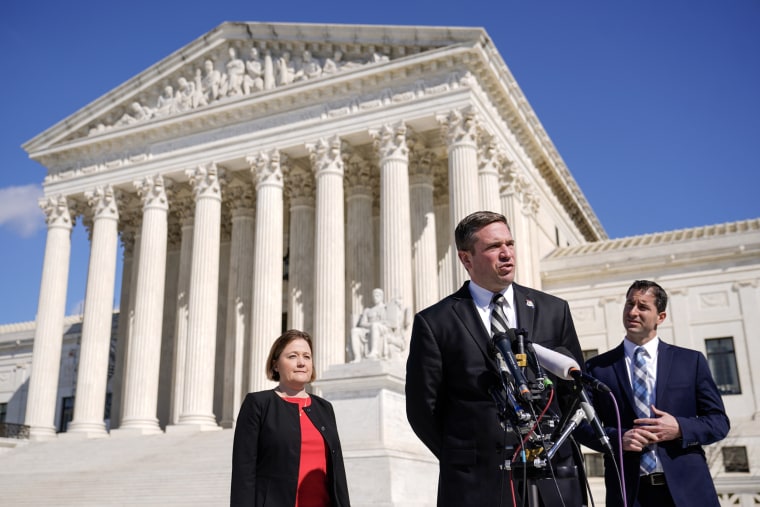
A Missouri judge on Monday temporarily blocked a unique rule that would require adults and children to undergo more than a year of therapy and fulfill other requirements before they could receive gender-affirming treatments such as puberty blockers, hormones and surgery.
St. Louis County Circuit Judge Ellen Ribaudo issued a temporary restraining order barring enforcement of Republican Attorney General Andrew Bailey’s emergency rule until May 15 unless she extends it. She scheduled a May 11 hearing on the lawsuit challenging the rule.
In her ruling, Ribaudo wrote that those suing to block the rule would “be subjected to immediate and irreparable loss, damage or injury if the Attorney General is permitted to enforce the Emergency Rule, and its broad, sweeping provisions were implemented without further fact-finding or evidence.”
She also wrote that patients are at “high risk” of having their medical care interrupted indefinitely and losing care through their current providers if the rule takes effect.
Bailey’s office vowed in a statement to continue defending the rule.
“We remain confident in our position because the Court even acknowledged that it deferred its consideration of the science until a later date,” his statement said, adding “six pages of endnotes” speak to the experimental nature of the care.

Gillian Wilcox, deputy director of litigation for the American Civil Liberties Union of Missouri, which filed suit on behalf of transgender Missourians, applauded the ruling.
Wilcox’ statement called it “a win for transgender Missourians over an unprecedented attempt by the Attorney General to unilaterally legislate and harm their right to self-expression, bodily autonomy, and access to lifesaving health care.”
Legal experts and transgender advocates say that if the lawsuit ultimately fails and Bailey’s rule takes effect, it would make Missouri the first state to restrict gender-affirming care for adults and the first to enact such restrictions through emergency rule-making instead of through a new law.
The lawsuit argues that the rule is discriminatory, and that Bailey sidestepped the Republican-led Legislature and exceeded his authority by attempting to regulate gender-affirming health care through Missouri’s consumer-protection law.
Dom Frazier, a 39-year-old transgender Kansas City resident who is not a plaintiff, said Bailey’s rule is about “dehumanizing and trying to ostracize a particular group of people.” He said allowing gender-affirming care is “giving people human rights.”
Simone Folsom, a 21-year-old transgender woman from Kansas City, said she spent “20 years emotionally deadened” until she began hormone treatments.

“It has literally made me feel like a person for the first time in my life,” said Folsom, who said the effort limit gender-affirming health care pushed her to demonstrate.
Bailey said the rule would shield minors from what he describes as experimental medical treatments, though puberty blockers and sex hormones have been prescribed for decades and the rule would also apply to adults.
The attorney general’s office has said there are 12,400 Missourians who identify as transgender, the ruling noted. The office estimated that 600 to 700 Missourians would begin intervention in the next year.
The rule was initially set to take effect last Thursday. It would require people to have experienced an “intense pattern” of documented gender dysphoria for three years and to have received at least 15 hourly sessions with a therapist over at least 18 months before they could receive puberty blockers, hormones, surgery or other treatment.

Before receiving care, patients would also have to be screened for autism, and any psychiatric symptoms from mental health issues would have to be treated and resolved. Minors, but not adults, also would have to be screened for “social media addiction” before treatments could begin.
Opponents called the rule discriminatory and illegal.
Tony Rothert, an attorney for the ACLU, told Ribaudo at a hearing Wednesday that the regulations would “cause immediate, severe and potentially irreparable harm” to people who could lose access to medications like puberty blockers and sex hormones.
“We don’t allow attorneys general to legislate, and we don’t allow them to play doctor,” Rothert said.
He and other attorneys said transgender people who can’t get gender-affirming care are at higher risk of suicide.

Assistant Attorney General Joshua Divine argued that Bailey’s order would not ban gender-affirming care, but provide “basic procedural guardrails.” He cited studies showing a high percentage of children seeking to transition are dealing with mental health issues, adding they should undergo “talk therapy” instead.
Bailey issued the restrictions after launching an investigation in February into the Washington University Transgender Center at St. Louis Children’s Hospital. The probe was prompted by a former employee who alleged that the center was providing children with gender-affirming care without informed consent, a sufficient individualized case review and wraparound mental health services. The university’s internal review found no misconduct, determing the claims were unsubstantiated.
Some transgender people have been trying to stockpile prescribed hormones or find alternative ways to get medications, fearful of losing access to the gender-affirming treatments many credit as life-saving. Some are considering leaving Missouri if the rule isn’t blocked.
“This feels like the end of Kansas City being my home,” said Stacy Cay, an autistic transgender woman. “It feels like it’s being taken away.”

Missouri’s Democratic House minority leader, Crystal Quade, said recently that she asked President Joe Biden and the Center for Medicare and Medicaid Services for an executive order extending coverage to Missourians who seek gender-affirming care in other states. She also asked the Democratic governors of Kansas and Illinois if their health care systems would accept Missouri patients for such care.
Bailey’s emergency rule on gender-affirming care come as Republicans across the country have proposed hundreds of laws aimed at transgender people. At least 13 states have enacted laws restricting or banning gender-affirming care for minors.
Bailey was appointed by Republican Gov. Mike Parson and took office in January. In a campaign email asking donors for money last week, Bailey said minors are “learning about their genders on TikTok.”
“Think about how frightening that is!” the campaign email said. “And think about how CRAZY it is to expose children to the twisted experiments advocated by extreme transgender activists.”

Brandon Hill, the interim president and CEO of Vivent Health, a health care provider with an LGBTQ+ and HIV focus serving Missouri and other states, questioned Bailey’s description of gender-affirming care as “experimental.” Hill said the same hormones used in gender-affirming treatment are used off-label to treat symptoms of menopause and help some cancer survivors.
“If you’re concerned about the drug and its potential effects, you should be concerned about it for everybody,” Hill said.
Meanwhile, Republican state lawmakers are fighting over competing Missouri House and Senate bills that would ban all gender-affirming care for minors. The chambers are split over which version to send to Parson, who is threatening to force the Legislature to keep working if nothing is done on the issue before their session’s scheduled May 12 finish.

 Latest Breaking News Online News Portal
Latest Breaking News Online News Portal




